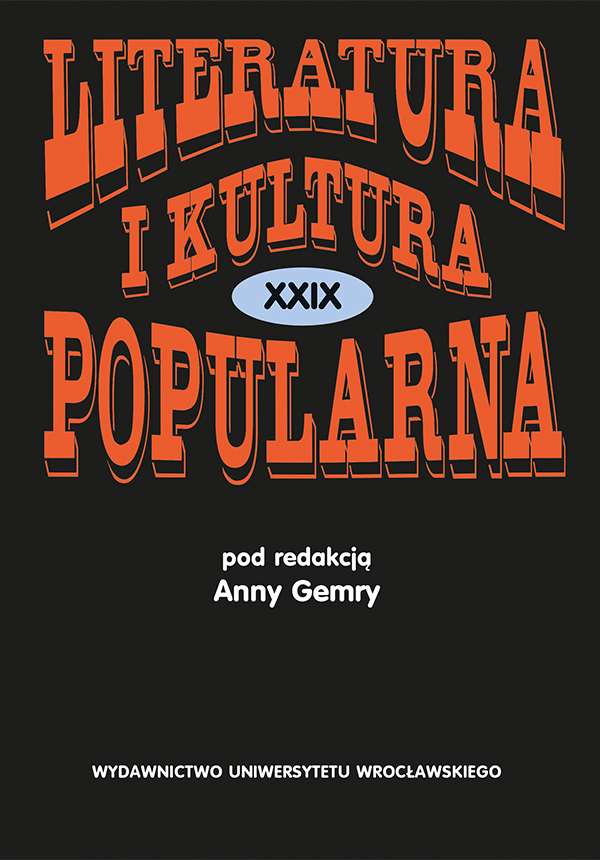

Artykuły

The aim of this paper is to analyse various forms of the so-called Cthulhu Mythos and describe specific shifts in reception and reflexion of H.P. Lovecraft’s legacy in contemporary culture. The opening part of the paper introduces H.P. Lovecraft as the author of weird fiction, cosmic horror and the philosophy of cosmicism, and corrects common misconceptions regarding the Cthulhu Mythos. Then, the semiotic versioning of three versions of the Cthulhu Mythos is explained and all three versions are further analysed. Version 1.0 of the Mythos includes Lovecraft’s legacy, works of the authors from the Lovecraft Circle, but also August Derleth’s interpretations of cosmic horror and works of the next generation of authors that emerged after Lovecraft’s death or were discovered and guided by Derleth. It’s a complex set of terminology, ideas, philosophies, plot devices and narratological specifications that is, as is further explained, wrongly interpreted as a fictional mythology. Version 2.0 includes all the works created under the label of ‘Lovecraftian’ or ‘cosmic’ horror, all transmedia adaptations, influences, and pop cultural additions where the influence of the original Mythos can be traced and is either explicitly admitted or just implied. Finally, Cthulhu Mythos 3.0 is a version of the Mythos that acknowledges the existence of the previous versions, yet approaches them through a specific self-reflective, self-critical lens and is more focused on intertextual play and metacommentaries on these previous versions than on expanding them.
Corben R., Rat God, Dark Horse Comics, Milwaukee 2015.
La Farge, P., The Night Ocean, Penguin Press, London 2017.
Moore A., Burrows J., The Courtyard, Avatar Press, Rantoul 2009.
Moore A., Burrows J., Neonomicon, Avatar Press, Rantoul 2011.
Moore A., Burrows, J., Providence Compendium, Avatar Press, Rantoul 2021.
Ruff M., Lovecraft Country, Harper Perennial, New York 2017.
Carrol N., The Philosophy of Horror: Or, Paradoxes of Heart, Routledge, Milton Park 1990.
Carter L., Lovecraft: A Look Behind the “Cthulhu Mythos”, Ballantine Books, New York 1972.
Cavanaugh P., ‘Underwater Director Confirms the Film’s H.P. Lovecraft Connections’, Comic-Book, 17.01.2020, https://comicbook.com/horror/news/underwater-ending-explained-monster-lovecraft-cthulhu/.
Essential Solitude: The Letters of H.P. Lovecraft and August Derleth, eds. S.T. Joshi, D.E. Schultz, Hippocampus Press, New York 2013.
Greene S.H., ‘Letter to Scott, Winfield Townley’, 1948, Brown University Library Digital Repository, https://repository.library.brown.edu/studio/item/bdr:417616/.
Harman G., Weird Realism: Lovecraft and Philosophy, Zero Books, Winchester 2012.
Jones M., ‘Tentacles and Teeth: The Lovecraftian Being in Popular Culture’, [in:] New Critical Essays on H.P. Lovecraft, ed. D. Simmons, Palgrave Macmillan, New York 2013, pp. 227–247.
Joshi S.T., I Am Providence: The Life and Times of H.P. Lovecraft, Hippocampus Press, New York 2013.
Joshi S.T., A Subtler Magick: The Writings and Philosophy of H.P. Lovecraft, Hippocampus Press, New York 2016.
Joshi S.T., Schultz D.E., Lord of a Visible World: An Autobiography in Letters, Hippocampus Press, New York 2019.
Klinger L.S., The New Annotated H.P. Lovecraft, Liverlight, New York 2014.
Leeming D., The Oxford Companion to World Mythology, Oxford University Press, Oxford 2005.
Leiber F., ‘A Literary Copernicus’, [in:] D. Schweitzer, Discovering H.P. Lovecraft, Borgo Press, San Bernardino 2001, pp. 7–16.
Lovecraft H.P., ‘On the Creation of Niggers’, 1912, https://repository.library.brown.edu/studio/item/bdr:425397/.
Lovecraft H.P., The Complete Fiction, Barnes and Noble, New York 2011.
Malíček J., Popkultúra: návod na použitie, Univerzita Konštantína Filozofa v Nitre, Nitra 2012.
Murray C., Corstorphine K., ‘Co(s)mic Horror’, [in:] New Critical Essays on H.P. Lovecraft, ed. D. Simmons, Palgrave Macmillan, New York 2013, pp. 157–191.
Münchow T., ‘Transgressing the Myth — H.P. Lovecraft’s Philosophy of Life and its Narrative Execution: An Essay’, Disputatio Philosophica: International Journal on Philosophy and Religion, 19, 2017, no. 1, pp. 38–49.
Nikolavich A., Gervasio-Aon-Lee, H.P. Lovecraft: He Who Wrote in the Darkness. A Graphic Novel, Pegasus Books, New York 2018.
Okorafor N., ‘Lovecraft’s Racism & the World Fantasy Award Statuette, with Comments from China Miéville’, Nnedi’s Wahala Zone Blog, 14.12.2011, http://nnedi.blogspot.com/2011/12/lovecrafts-racism-world-fantasy-award.html.
Price R.M., ‘Lovecraft’s “Artificial Mythology”’, [in:] An Epicure in the Terrible, eds. D.E. Schulz, S.T. Joshi, Hippocampus Press, New York 2011, pp. 257–266.
Rajewski I.O., ‘Intermediality, Intertextuality and Remediation: A Literary Perspective on Intermediality’, Intermédialités 2005, no. 6, pp. 43–64.
‘Semantic Versioning Specification (SemVer)’, Semantic Versioning 2.0.0., https://semver.org/.
Schultz D.E., ‘From Microcosm to Macrocosm: The Growth of Lovecraft’s Cosmic Vision’, [in:] An Epicure in the Terrible, eds. D.E. Schulz, S.T. Joshi, Hippocampus Press, New York 2011. pp. 208–230.
Schultz D.E., ‘Who Needs the “Cthulhu Mythos”?’, Lovecraft Studies 5, 1986, no. 2, pp. 43–53.
Tibbets J.C., The Gothic Imagination: Conversations on Fantasy, Horror and Science Fiction in Media, Palgrave Macmillan, New York 2011.
Tierney R.L., ‘The Derleth Mythos’, Nightscapes, 9.04.2004, http://www.epberglund.com/RGttCM/nightscapes/NS04/hplnf3.htm.
Call of Cthulhu: Dark Corners of the Earth, published by Bethesda Softworks, 2K Games, Ubisoft, 2005 (Xbox), 2006 (Microsoft Windows).
Cthulhu Saves the World, published by Zeboyd Games, 2010 (Microsoft Windows).
Underwater (dir. William Eubank, USA 2020).
Willow (2023, Disney+, USA).